Goodnight from Holyrood Live...published at 16:32 BST 21 September 2017

That ends our coverage of the Scottish Parliament for Thursday 21 September 2017.
We'll be back next week.
Have a good weekend.
The Social Security Committee takes evidence on the Social Security Bill
Support for the farm industry and disabled access at Waverley station are raised during general questions
Nicola Sturgeon takes the hot seat for first ministers questions
Urgent question: Combustible cladding in construction of Glasgow private high rises
MSPs debate the Contract (Third Party Rights) (Scotland) Bill for the last time, before voting on whether to pass it at decision time
Craig Hutchison and Colin Bell

That ends our coverage of the Scottish Parliament for Thursday 21 September 2017.
We'll be back next week.
Have a good weekend.
 Image source, istockphoto
Image source, istockphotoMSPs unanimously pass the Contract (Third Party Rights) (Scotland) Bill., external
MSPs will now vote on whether to pass the Contract (Third Party Rights) (Scotland) Bill.
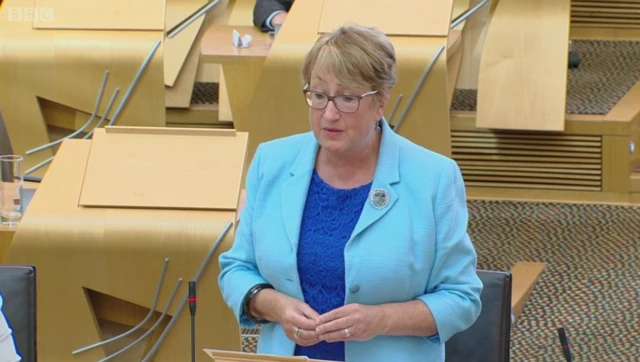
Ms Ewing thanks the committee for its help on this Bill and says the government took the view of the committee on board.
The legal affairs minister says the ability to create third party rights is important.
She says legislation like this often manages to have momentum of its own and practitioners and professions have a responsibility to promote the Bill.
Ms Ewing says once people start using the provisions of the Bill that should instill confidence that it is fit for purpose.
The minister calls on MSPs to pass the Bill.
Legal Rights Minister Annabelle Ewing says: "It's goodbye to jus quaesitum tertio."
Common law doctrine of jus quaesitum tertio will be removed by the Contract (Third Party Rights) (Scotland) Bill.
It means "rights on account of third parties".
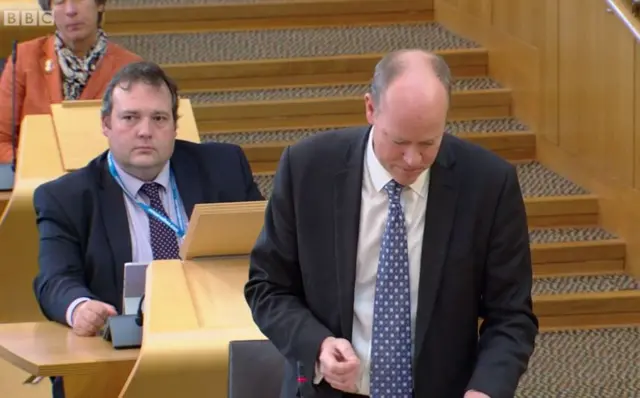 Image source, bbc
Image source, bbcTory MSP Gordon Lindhurst
Tory MSP Gordon Lindhurst says: "We can all agree the simplification and clarification of the law is a good thing."
Mr Lindhurst says a question mark has been raised over the operation of the act.
He asks the cabinet secretary for clarification.
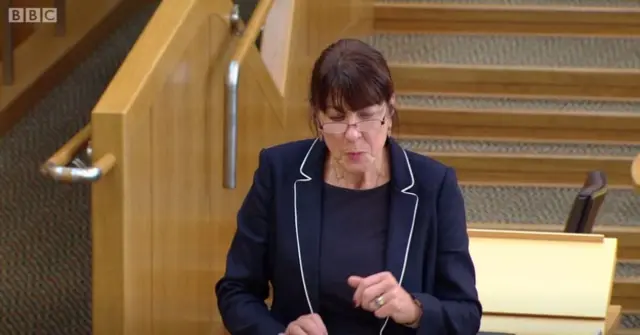 Image source, bbc
Image source, bbcLabour MSP Mary Fee
Labour MSP Mary Fee thanks the Scottish Law Commission for undertaking the work that has resulted in the Contract (Third Party Rights) (Scotland) Bill.
Ms Fee says the Bill has the backing of stakeholders.
She says this Bill's intention is to promote the use of Scots law.
However some may continue to use English law and that is something MSPs will have to be mindful of.
Allow X content?
This article contains content provided by X. We ask for your permission before anything is loaded, as they may be using cookies and other technologies. You may want to read X’s cookie policy, external and privacy policy, external before accepting. To view this content choose ‘accept and continue’.
Allow X content?
This article contains content provided by X. We ask for your permission before anything is loaded, as they may be using cookies and other technologies. You may want to read X’s cookie policy, external and privacy policy, external before accepting. To view this content choose ‘accept and continue’.
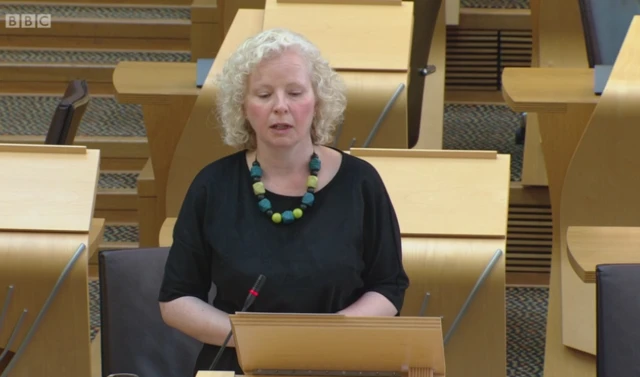
Labour MSP Claire Baker says the minister recognised the arguments from the Law Society on section 10.
Ms Baker says the Bill has received considerable scrutiny.
She says it will provide a statutory framework on third party rights.
Ms Baker aks what role the government can play in promoting the use of this Bill.
The Delegated Powers and Law Reform Committee published its report on the Contract (Third Party Rights) (Scotland) Bill on 12 May 2017., external
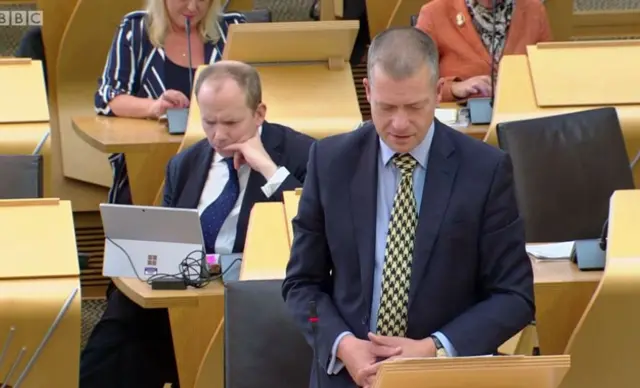 Image source, bbc
Image source, bbcTory MSP Graham Simpson
Tory MSP Graham Simpson says contract law was not something he talked about much as a Scottish Sun journalist.
Mr Simpson says the Bill will improve the law in Scotland which he welcomes.
He says some find the bill "dry, technical and even ever so slightly dull" but he says it provides clarity.
The Tory MSPs says, however, it will help real people in everyday circumstances.
Ms Ewing says voting for this Bill will ensure an important area of the law is updated.
The legal affairs minister says this will make sure it is fit for purpose.
She moves the Bill in her name.
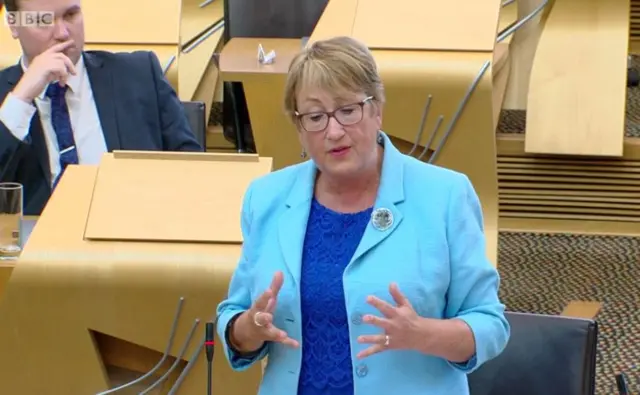 Image source, bbc
Image source, bbcMs Ewing says: "The current uncertainty of third party rights damages the reputation of Scots law."
The legal affairs minister says the workarounds like using English law bring their own problems.
She says this Bill will improve the standing of Scots law.
It abolishes the common law rule she says and addresses the issue of irrevocability.
The changes proposed are based on recommendations made by the Scottish Law Commission (SLC), which found in 2016 that the existing law is no longer fit for purpose.
The main proposal is the abolition of the existing rule that third-party rights have to be irrevocable to be created – in other words that the parties must intend to give up the right to change their minds about granting the right.
 Image source, Chesirecat
Image source, ChesirecatAccording to the SLC, this rule creates a significant barrier to the use of third-party rights as it restricts the freedom of the contracting parties to:
Other proposals are aimed at clarifying current areas of uncertainty in the common law.
The Bill also includes new rules which mean that third-party rights to arbitrate could be created.
The general aim behind the Bill is to provide a new statutory framework with clearer, more usable rules on third-party rights.
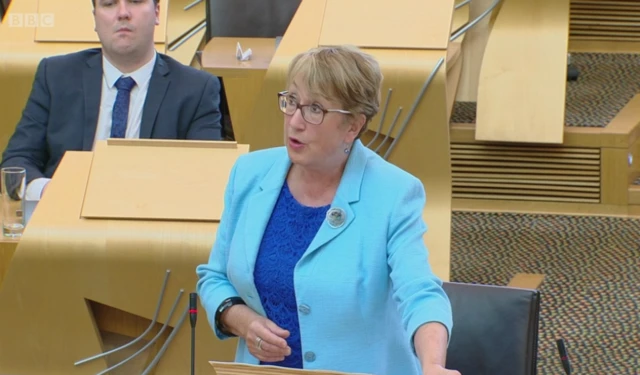
Legal Affairs Minister Annabelle Ewing says the Bill is of a specialist nature but its provisions have the potential to impact on anyone.
Ms Ewing says this is the first change to this law for the past 100 years.
The legal affairs minister says the law has previously been criticised for being unclear meaning English law if often chosed over Scottish law which damages Scots law reputation.
The Contract (Third Party Rights) (Scotland) Bill , external was introduced in the Scottish Parliament on 31 January 2017.
It proposes codifying and updating the existing common law on third-party rights – i.e. the rules in case law which allow the parties to a contract to grant rights to third parties.
Third party rights may be used in a variety of situations, for example by companies which want other companies in their group to be covered by a contract, or where someone wants to ensure that the benefits of an insurance contract are payable to another person (e.g. a third-party driver in a motor insurance policy).
The Contract (Third Party Rights) (Scotland) Bill (the Bill) proposes changing the law in Scotland which allows the parties to a contract to create rights for third parties.
The aim is to make the law clearer and more usable.
The Bill implements the recommendations made by the Scottish Law Commission in its 2016 Report “Review of Contract – Report on Third Party Rights”, external.
Article share tools
 Image source, istockphoto
Image source, istockphotoMSPs will now debate the Contract (Third Party Rights) (Scotland) Bill for the final time.
The bill aims to reform the current rule of contract law which creates an "enforceable right" in favour of a third party and replace it with a "statutory version".